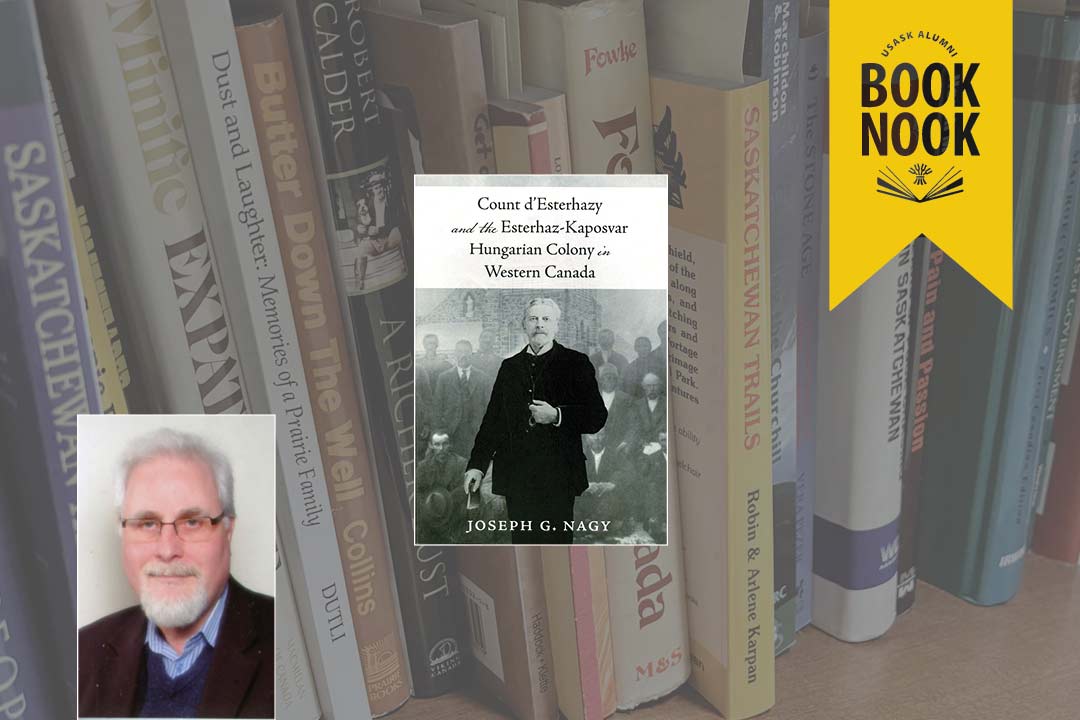
Alumni Book Nook: Dr. Joseph G. Nagy (BSA’72, MSc’74)
Retired agricultural and applied economist Dr. Joseph G. Nagy has written his first book, Count d’ Esterhazy and the Esterhaz-Kaposvar Hungarian Colony in Western Canada
University of Saskatchewan (USask) graduate Dr. Joseph G. Nagy (BSA’72, MSc’74), who studied agricultural economics in USask’s College of Agriculture and Bioresources, is the author of Count d’ Esterhazy and the Esterhaz-Kaposvar Hungarian Colony in Western Canada. Published by FriesenPress, the non-fiction book explores “not only the history of Count d’Esterhazy and the Esterhaz Colony but also a history of what motivated immigrants to leave their country, how Western Canada changed from a dominant fur-trade economy into an agriculturally based economy, and the problems faced by the Canadian immigration agencies, the immigration agents, and the settlers,” he said. While Nagy has published numerous articles and research papers in refereed journals throughout his career as an agricultural and applied economist, this is his first book.
Nagy has personal connections to the book’s subject matter; his great-great-grandparents moved from Hungary to the Esterhaz Colony in Canada in 1888, and his family continues to farm some of the land that was previously farmed by his great-great-grandfather and great-grandfather. Nagy now lives in Saskatoon with his wife, Margaret Sweeney, and maintains an interest in the family farm, which he farms with his brothers.
After completing his master’s degree at USask in 1974, Nagy went on to earn a PhD in agricultural and applied economics at the University of Minnesota and spent his career as an agricultural and applied economist specializing in economic development in emerging countries. As a result of his employment with Agriculture Canada and the United Nations, Nagy has lived in several international locales, including Rome, Italy, and Budapest, Hungary, and his work has taken him to Burkina Faso, Pakistan, Togo, and countries in Eastern Europe and Asia. In his retirement, he has developed an interest in writing about his family’s genealogy and local history.
The Green&White asked Nagy about Count d’ Esterhazy and the Esterhaz-Kaposvar Hungarian Colony in Western Canada and what inspired him to write the book.
What is the focus of your new book?
Throughout the late 1800s, waves of immigrants came over from Europe to North America, their arrival serving a dual purpose. On the one hand, the immigrants were seeking a better life for themselves and their families. On the other hand, the Canadian federal, provincial, and territorial governments were seeking to populate their territory in a bid to maintain sovereignty over the land and to develop it for agriculture. Among these immigrants were the Hungarian and Western Slavic settlers who founded the Esterhaz Colony, which later became known as the Kaposvar and Kolin districts, in southeastern Saskatchewan. A key figure in the founding of this colony was the enigmatic Count Paul O. d’Esterhazy, aka Janos Baptiste Packh. As an immigration agent for the Canadian and American governments, he worked tirelessly not only to promote immigration to the Kaposvar and Kolin districts but also to improve the lives of the immigrants who settled there.
Although d’Esterhazy was not without his detractors, this book takes pains to emphasize the
sincerity of his vision of a “Little Hungary on the Canadian Prairies” and the many challenges that he and other proponents of the colony faced as they sought to see that vision fulfilled. Meticulously researched and documented, this book offers a treasure trove of insight into not only the Esterhaz colony and surrounding area but also the myriad and often conflicting forces involved in the founding of Canada as a nation.
What inspired you to write this book?
My great-great-grandparents emigrated from Hungary to the Esterhaz Colony in 1888 and some of the history of the colony was passed down to me by my family. My family were parishioners of Kaposvar Church, where I was an altar boy for a time. As time went by, the older generation were not around to keep the history alive and the younger generations—my generation—knew little about the founder and founding of the Esterhaz colony and its history to the present. A book was needed to document this history, and I took up the task.
Did your education at USask play a role in researching and/or writing this book? If so, how?
The book required a lot of research from various sources, many hidden in archives and newspapers and articles. My university training as a researcher helped me find and sort out the various information so that I could present the history in a comprehensive and systematic manner that conveyed the entire story.
What adjectives would you use to describe your book?
Informative, meticulous, and entertaining.


